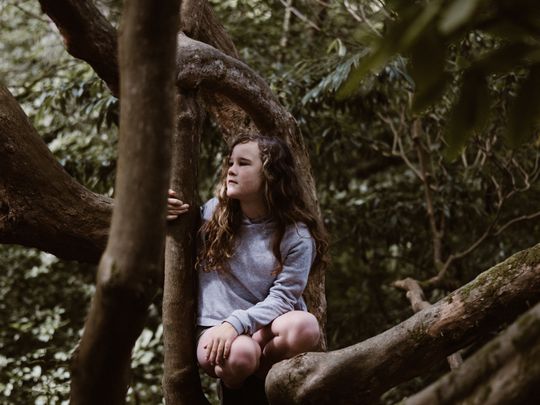
Less screen time and more green time have been linked with better psychological and intellectual outcomes among children and adolescents, according to a new Australian study.
Conducted by researchers at the University of Adelaide, the systematic review of almost 200 studies found that screen time can have a negative impact not only on children’s emotional wellbeing, but also on their academic achievement. It also found that green time (time spent in nature outdoors) could potentially ‘cure’ or act as a buffer against this negative impact of screen time.
With a large proportion of schooling in the UAE happening online at the moment, and many children spending more time on screens than ever before, it’s never been more important to understand the impact on our kids and what can be done about.
How screen time affects children’s brains and wellbeing
“Many studies have highlighted the various dangerous psychological and medical effects of excessive screen time use - this is particularly for those using smartphones, and for more than three hours a day,” says Mandeep Jassal, Behavioural Therapist at Priory Wellbeing Centre, Dubai. “Findings demonstrate that the brain chemistry of young people addicted to screens and the internet may become imbalanced, leading to irritability, increase in emotional distress, broken sleep patterns, isolation and higher levels of anxiety and depression.”
Technological developments in recent decades have increased young people's engagement with screen-based technologies (screen time), and a reduction in young people's contact with nature (green time) has been observed concurrently, according to University of Adelaide researchers.
This has been exacerbated further by the pandemic, with its mixture of home-learning and health concerns about going out into the public realm. “In these current, unprecedented times, we have naturally all had to adapt, and no more so than children with home-schooling, with the result that many have been spending a far greater amount of time on electronic devices,” says Jassal. “Many parents, and children, feel there is no alternative if they are to keep up to date with schoolwork.”
Can nature work to 'cure' the negative impact of screen time?
There is plenty of research that shows that, in general, high levels of screen time appear to be associated with unfavourable psychological outcomes, while green time appears to be associated with favourable psychological outcomes, says Tassia Oswald from the University of Adelaide.
But studies investigating the psychological impacts of screen time or green time typically considers each factor in isolation and fails to delineate the reciprocal effects of high technology use and low contact with nature on mental health and cognitive outcomes.
To address this question, Oswald and colleagues analysed the findings of 186 studies to collate evidence assessing associations between screen time, green time, and psychological outcomes (including mental health, cognitive functioning, and academic achievement) for children and adolescents.
"This systematic review highlights that nature may currently be an under-utilised public health resource, which could potentially function as an upstream preventative and psychological well-being promotion intervention for children and adolescents in a high-tech era,"
According to the authors, preliminary evidence suggests that green time could potentially buffer the consequences of high screen time. "Investment in more rigorous research is needed to explore this," they wrote in a paper published September in the open-access journal PLOS ONE.
In order to develop into strong, healthy and happy individuals - both physically and mentally - young people need to be encouraged to ‘switch off’ from their technogical devices whenever possible and embrace ‘screen-free’ time, says Mandeep Jassal, Behavioural Therapist at Priory Wellbeing Centre, Dubai.
“Any form of screen time encourages sedentary behaviour so dedicated ‘breaks’ during each school day, and at the end of each day, should be set aside whereby children are encouraged to be active, engaged in face-to-face social interaction, and to explore and participate in ‘real life’ situations and activities. By enforcing such boundaries also sends a positive message to children from a young age about discipline and undertaking tasks in moderation. This can help prepare them for later life with, for example, time-keeping and healthy boundaries with work.”
The screen-time hierarchy
Not all screen time is created equal, says Jassal. “Clearly, working on a device completing schoolwork is a lot less damaging mentally than, for example, playing excessively on video games or interacting across various social media platforms. Home-learning by its very nature is encouraging interaction, enlightenment, creativity, critical thinking and is generally enriching for the child.”
However, social media and unsupervised internet access can have a seriously negative impact. “These types of screen time know no bounds and allows children access to sites which can promote pornography, gambling and violence and allow cyberbullying, with the potential for serious consequences,” Jassal adds. “Social media in particular can present a highly distorted view of the world and has the capability to negatively impact an individual’s confidence, self-esteem and general wellbeing.”
So, it’s vital that parents remain constantly engaged with their children. “We would also always encourage parents to remain vigilant as to the type of sites their children are visiting and to always ensure they use them in the presence of others, so parents can subtly monitor what sites they are visiting and ensure that the privacy settings have been checked. While some ‘mindless’ fun is good in small doses, and not everything has to be ‘educational’ as far as screen time is concerned, the key thing for parents to ensure is how their child is engaged with it – i.e. on a positive or negative level.”
Nature Deficit Disorder
Making an effort to encourage children to spend time in nature is something that Richard Louv, co-founder and chairman emeritus of the Children and Nature Network and author of Last Child in the Woods: Saving Our Children From Nature-Deficit Disorder, has been recommending for years.“As technology now dominates almost every aspect of our lives, much of society no longer sees time spent in the natural world and independent, imaginary play as enriching. Technology is not, in itself, the enemy, but our lack of balance is lethal and the pandemic of inactivity is one result,” he says. “Nature-deficit disorder, as defined in my book, is a metaphor to describe what many of us believe is the human cost of alienation from nature, namely: diminished use of the senses, attention difficulties, higher rates of physical and emotional illnesses, a rising rate of myopia, child and adult obesity and Vitamin D deficiency.”
“Experiences in the natural world appear to offer great benefits to psychological and physical health and the ability to learn,” Louv continues. “Research strongly suggests that time spent in nature can help many children learn to build confidence in themselves, reduce the symptoms of Attention Deficit Hyperactivity Disorder (ADHD), foster calm and aid focus. One of the most gratifying benefits of a nature-rich life is building stronger relationships within the family, among friends and in the community.”
Finding green time in the UAE
While the COVID-19 restrictions make outside activities and ‘green time’ more difficult, we all just need to be that little bit more creative, says The Priory’s Jassal “Make the most of the amazing beaches and pools in the UAE – a great way to get a healthy dose of Vitamin D and burn off pent-up energy. Evening walks together with family are a great way to ‘switch off’ and ask each other about their day, without any interruptions. Take up star-gazing - with the current low pollution levels on account of restricted flights and travel, it’s now easier than ever to enjoy the night sky! Plant a window box together with various plants and herbs and use the latter in recipes and cooking together.”
Allowing our minds to rest in other ways other than being on ours phones or laptops is essential for good mental health. “Practicing mindfulness allows us to feel grounded with activities we are doing in the present moment without judging uncomfortable thoughts and feelings that may arise,” she adds. “Using all our senses; sight, smell, sound, touch and taste allows us to connect with the ‘here and now’. The more we can exercise this muscle in our brain, the more mentally fitter and resilient we can become.”








